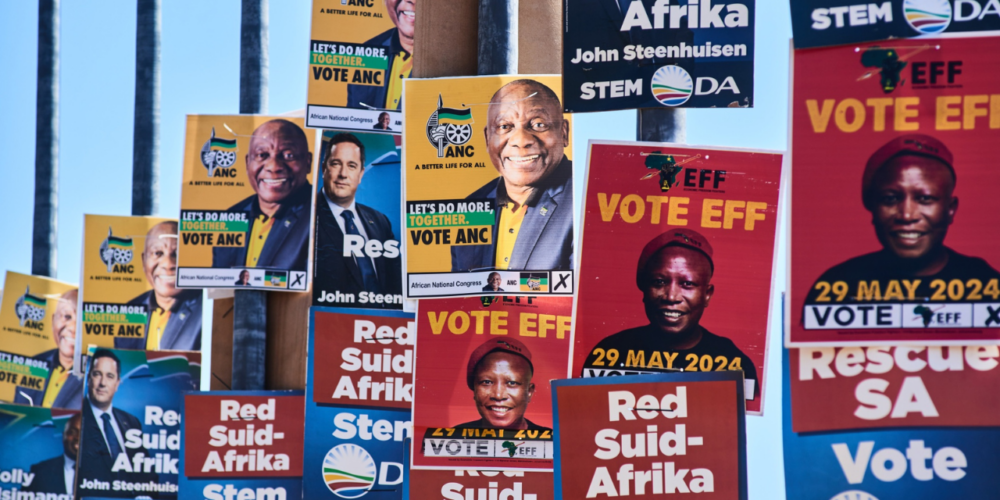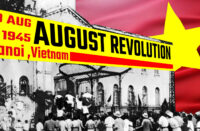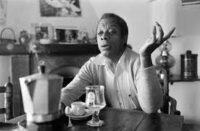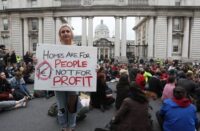In recent months, South Africa has led the way in making the case to the International Court of Justice that the Israeli government must be held accountable for genocide in Gaza. South Africa, under the leadership of the African National Congress (ANC), once again stood out as a beacon of progressive politics internationally – just as it did 30 years ago when, having led the complex struggle that overturned apartheid, the ANC won almost two thirds of the vote in the first democratic election and formed the first government with Nelson Mandela as President. However as the recent general election results show, after 30 years in office, the ANC has a much more tarnished reputation amongst the South African people today.
Prior to the national election on 29th May 2024, many predicted the party’s vote would fall below the 50% required for government. It was no longer tenable to assume mass support based on what the ANC had done in the past given the chronically high rates of unemployment (32%), especially for young people (over 50%), a poverty rate of 62%, housing shortages, poor local service delivery, policing unable to manage the high levels of violent crime, often gender-based, and the degraded national infrastructure including recurring power cuts and water shortages. Not only was the ANC riven by internal factions but it was also at the highest levels mired in economic corruption, so extensive that the term “state capture” was coined and the previous President, Jacob Zuma, was removed from office. This was not the party of the Freedom Charter.
Few however expected the vote for the ANC to fall to the low of 40% as it did. Faced with that chastening result President Cyril Ramaphosa persuaded the ANC leadership to take the unexpected step of negotiating a coalition to maintain ‘stability’ – so often a code word for protecting the capitalist system. The coalition is primarily between the ANC and the Democratic Alliance (DA, who received 21% of the vote) but also bundles in 8 smaller, mostly regionally based parties, accounting in all for around 70% of the National Assembly. That allowed a Government of National Unity to be elected along with the return of Ramaphosa as President. Not part of the coalition are two populist parties based on splits from the ANC to the right, the MK Party who gained 15% of the vote build around the disgraced ex-President Jacob Zuma with its support based in Kwa Zulu Natal; and to the left, the Economic Freedom Fighters, built around the expelled ANC Youth League leader Julius Malema with its primarily urban youth based vote of 10%.
The South African Communist Party (SACP), which along with the Congress of South African Trade Unions (COSATU), are part of the institutional structure of the ANC: the “Triple Alliance” has welcomed the forming of an ANC-led government. The SACP still assesses the ANC to be “the only worthwhile political force advancing the needs, interests, and aspirations of the working class and the poor”. However the SACP has also made very clear that it was opposed to bringing the DA into government given that party’s ingrained racist mindset, support for neo-liberal economic policies and a Washington-dictated world order (including support for the Israeli genocide). As an SACP spokesperson succinctly put it: the DA “stands for neocolonialism of a special type and is at the service of imperialist regimes.”
The way to respond to the loss of popular support in the face of what the SACP terms “the glaring weaknesses” of the ANC’s record in government is not an accommodation with the DA based on protecting and furthering the turn to neo-liberalism by the ANC leadership under Presidents Mandela and Mbeki in the late 1990s. Rather there is an urgent need to recognise that sections of South African capital now see the real possibility of achieving their long held goal of unseating the ANC and by extension the prospect of further developing the National Democratic Movement that had overturned apartheid and opened the road to socialism. In response, there needs to be a forceful reassertion of the struggle for national democratic revolutionary transformation.
To take the struggle forward there needs to be “a popular Left front and a powerful, socialist movement of the workers and poor”. That alone can both achieve the immediate advances being demanded by the South African people and secure the leading role of the working class in all fronts of the struggle and key centres of power. It will also enable defending and further developing the progressive thrust of South Africa’s international relations, including deepening alignment with the BRICS Plus community of states and solidarity against imperialist aggression. Achieving that class centred popular front with the left at its core will, in the words of the SACP: “play a key role in the changing configuration and shifting balance of forces, including with regard to the question of alliances”.






